Related Research Articles

The European Environment Agency (EEA) is the agency of the European Union (EU) which provides independent information on the environment.
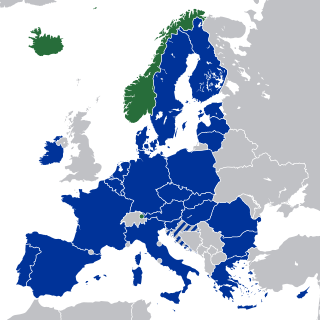
The European Economic Area (EEA) was established via the Agreement on the European Economic Area, an international agreement which enables the extension of the European Union's single market to member states of the European Free Trade Association (EFTA). The EEA links the EU member states and three of the four EFTA states into an internal market governed by the same basic rules. These rules aim to enable free movement of persons, goods, services, and capital within the European single market, including the freedom to choose residence in any country within this area. The EEA was established on 1 January 1994 upon entry into force of the EEA Agreement. The contracting parties are the EU, its member states, and Iceland, Liechtenstein, and Norway. New members of EFTA would not automatically become party to the EEA Agreement, as each EFTA State decides on its own whether it applies to be party to the EEA Agreement or not. According to Article 128 of the EEA Agreement, "any European State becoming a member of the Community shall, and the Swiss Confederation or any European State becoming a member of EFTA may, apply to become a party to this Agreement. It shall address its application to the EEA Council." EFTA does not envisage political integration. It does not issue legislation, nor does it establish a customs union. Schengen is not a part of the EEA Agreement. However, all of the four EFTA States participate in Schengen and Dublin through bilateral agreements. They all apply the provisions of the relevant Acquis.

The European Union (EU) has expanded a number of times throughout its history by way of the accession of new member states to the Union. To join the EU, a state needs to fulfil economic and political conditions called the Copenhagen criteria, which require a stable democratic government that respects the rule of law, and its corresponding freedoms and institutions. According to the Maastricht Treaty, each current member state and the European Parliament must agree to any enlargement. The process of enlargement is sometimes referred to as European integration. This term is also used to refer to the intensification of co-operation between EU member states as national governments allow for the gradual harmonisation of national laws.
The European Union has a number of relationships with foreign states. According to the European Union's official site, and a statement by Commissioner Günter Verheugen, the aim is to have a ring of countries, sharing EU's democratic ideals and joining them in further integration without necessarily becoming full member states.
European integration is the process of industrial, economic, political, legal, social, and cultural integration of states wholly or partially in Europe, or nearby. European integration has primarily but not exclusively come about through the European Union and its policies.
A European Union Association Agreement or simply Association Agreement (AA) is a treaty between the European Union, its Member States and a non-EU country or bloc of countries that governs bilateral relations. Areas frequently covered by such agreements include the development of political, trade, social, cultural and security links. The provision for an association agreement was included in the Treaty of Rome, which established the European Economic Community, as a means to enable co-operation of the Community with the United Kingdom, which had retreated from the treaty negotiations at the Messina Conference of 1955. According to the European External Action Service, for an agreement to be classified as an AA, it must meet several criteria:
1. The legal basis for [association agreements'] conclusion is Article 217 TFEU
2. Intention to establish close economic and political cooperation ;
3. Creation of paritary bodies for the management of the cooperation, competent to take decisions that bind the contracting parties;
4. Offering most favoured nation treatment;
5. Providing for a privileged relationship between the EC and its partner;
6. Since 1995 the clause on the respect of human rights and democratic principles is systematically included and constitutes an essential element of the agreement;
7. In a large number of cases, the association agreement replaces a cooperation agreement thereby intensifying the relations between the partners.
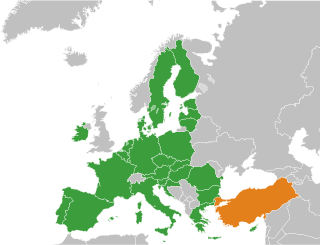
Turkey is negotiating its accession to the European Union (EU) as a member state, following its application to become a full member of the European Economic Community (EEC), the predecessor of the EU, on 14 April 1987.

The European Neighbourhood Policy (ENP) is a foreign relations instrument of the European Union (EU) which seeks to tie those countries to the east and south of the European territory of the EU to the Union. These countries include some who seek to one day become either a member state of the European Union, or become more closely integrated with the European Union. The ENP does not apply to neighbours of the EU's outermost regions, specifically France's territories in South America, but only to those countries close to EU member states' territories in mainland Europe.

Relations between the European Union (EU) and Moldova are currently shaped via the European Neighbourhood Policy (ENP), an EU foreign policy instrument dealing with countries bordering its member states.

The Commissioner for Neighbourhood and Enlargement is the member of the European Commission in charge of overseeing the accession process of prospective new member states and relations with those bordering the European Union (EU). The present commissioner, as of December 2019, is Olivér Várhelyi.
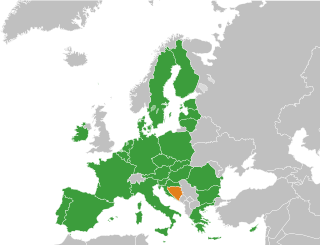
The accession of Bosnia and Herzegovina to the European Union (EU) is the stated aim of the present relations between the two entities. Bosnia and Herzegovina has been recognised by the European Union as a "candidate country" for accession since the decision of the European Council in 2022 and is on the current agenda for future enlargement of the EU. Bosnia and Herzegovina takes part in the Stabilisation and Association Process and trade relations are regulated by an Interim Agreement.
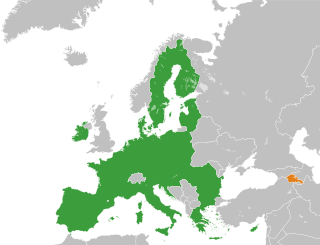
Armenia and the European Union have maintained positive relations over the years. Both parties are connected through the Comprehensive and Enhanced Partnership Agreement (CEPA), which was signed in 2017. Former Armenian foreign minister Eduard Nalbandyan expressed confidence that the new partnership agreement would "open a new page" in EU–Armenia relations. Meanwhile, the former High Representative of the Union for Foreign Affairs and Security Policy, Federica Mogherini concluded in June 2019, that Armenia–EU relations are on an "excellent" level. Should either Georgia or Turkey, who are candidates for EU membership, accede to the EU, Armenia will border the European Union.

The Republic of Azerbaijan and the European Union (EU) have maintained a positive relationship through the years and have become more closely linked since 1991. Azerbaijan is currently part of the European Neighborhood Policy, the Eastern Partnership and the Council of Europe. The EU is the largest foreign grant donor to and investor in Azerbaijan, both in the government sector and civil society, making available over 600 million EURO of bilateral EU assistance since 1992.
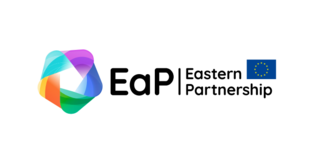
The Eastern Partnership (EaP) is a joint initiative of the European Union, together with its member states, and six Eastern European countries. The EaP framework governs the EU's relationship with the post-Soviet states of Armenia, Azerbaijan, Belarus, Georgia, Moldova, and Ukraine. The EaP is intended to provide a forum for discussions regarding trade, economic strategy, travel agreements, and other issues between the EU and its Eastern European neighbours. It also aims at building a common area of shared values of democracy, prosperity, stability, and increased cooperation. The project was initiated by Poland and a subsequent proposal was prepared in co-operation with Sweden. It was presented by the foreign ministers of Poland and Sweden at the EU's General Affairs and External Relations Council in Brussels on 26 May 2008. The Eastern Partnership was inaugurated by the EU in Prague, Czech Republic on 7 May 2009.

There are currently nine states recognized as candidates for membership of the European Union: Albania, Bosnia and Herzegovina, Georgia, Moldova, Montenegro, North Macedonia, Serbia, Turkey, and Ukraine. Kosovo formally submitted its application for membership in 2022 and is considered a potential candidate by the European Union. Due to multiple factors, talks with Turkey are at an effective standstill since December 2016.

The largest enlargement of the European Union (EU), in terms of number of states and population, took place on 1 May 2004.

The Union for the Mediterranean is an intergovernmental organization of 43 member states from Europe and the Mediterranean Basin: the 27 EU member states and 16 Mediterranean partner countries from North Africa, Western Asia and Southern Europe. It was founded on 13 July 2008 at the Paris Summit for the Mediterranean, with an aim of reinforcing the Euro-Mediterranean Partnership (Euromed) that was set up in 1995 as the Barcelona Process. Its general secretariat is located in Barcelona, Catalonia, Spain.
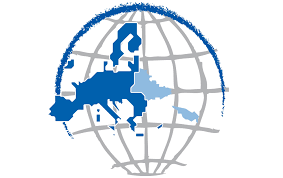
The EuroNest Parliamentary Assembly is the inter-parliamentary forum in which members of the European Parliament and the national parliaments of Ukraine, Moldova, Armenia, Azerbaijan and Georgia participate and forge closer political and economic ties with the European Union. It was established in 2011 by the European Commission as a component of the Eastern Partnership. After the elections in Belarus in 2010 were declared as flawed by the OSCE, the membership of Belarus in Euronest was automatically suspended. Belarus is welcome to re-join the Assembly once political requirements have been fulfilled. In 2015, Azerbaijan's membership was suspended due to the European Union's criticism of human rights abuses by the government. In September 2016, it was announced that Azerbaijan would take the necessary steps towards restoring ties. As of 2017, the combined population of Euronest members stands at 61,927,521 people.
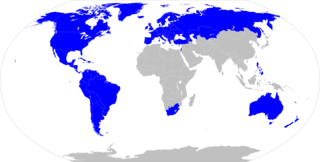
The Eurosphere or the European Empire is a concept centered around the European Union's sphere of influence, a term associated with the public intellectual Mark Leonard, Oxford University academic Jan Zielonka, the European Union Director-General for Politico-Military Affairs Robert Cooper and the former European Commission President José Manuel Barroso.

Tunisia–European Union relations are the foreign relations between the country of Tunisia and the European Union.
References
- ↑ Knelangen, Wilhelm (1 January 2007). "A Neighbourhood of Freedom, Security and Justice?". … Policy. Challenges for the EU-Policy towards ….
- ↑ "EU-Turkey: Privileged partnership, less democracy?". www.eurozine.com. 8 July 2008. Retrieved 31 October 2024.
- ↑ Scott, James Wesley (2009). "BORDERING AND ORDERING THE EUROPEAN NEIGHBOURHOOD: A CRITICAL PERSPECTIVE ON EU TERRITORIALITY AND GEOPOLITICS". TRAMES. XIII (3): 232–247. ISSN 1406-0922.
- ↑ Kahraman, Sevilay (1 January 2005). "THE EUROPEAN NEIGHBOURHOOD POLICY: THE EUROPEAN UNION'S NEW ENGAGEMENT". PERCEPTIONS: Journal of International Affairs. 10 (4): 1–28. ISSN 1300-8641.
- ↑ Winkler, Heinrich August (13 November 2002). "EU: Wir erweitern uns zu Tode". Die Zeit (in German). ISSN 0044-2070 . Retrieved 31 October 2024.
- 1 2 "WHAT IS PRIVILEGED PARTNERSHIP FOR?", Diplomatic Observer, 16 July 2009, see here [usurped]
- 1 2 "Preserving Europe : Offer Turkey a privileged partnership instead" By Karl-Theodor zu Guttenberg, Wednesday, 15 December 2004, see here
- 1 2 Team, Editorial (31 May 2003). "French president speaks for Russia-EU privileged partnership". PravdaReport. Retrieved 31 October 2024.
- 1 2 "Spanish foreign minister backs 'virtual membership' for Israel". EUobserver. 3 December 2004. Retrieved 31 October 2024.
- 1 2 3 4 5 6 7 "Merkel moots 'privileged partnership' for Balkans". EUobserver. 17 March 2006. Retrieved 31 October 2024.
- ↑ "COMMUNICATION FROM THE COMMISSION, European Neighbourhood Policy STRATEGY PAPER, Brussels, 12.5.2004 COM(2004) 373 final see here
- ↑ Chifu, Iulian (2006). "The Eastern Dimension of the European Neighbourhood Policy: A Romanian Approach". EuroJournal.org - Journal of Foreign Policy of Moldova (10).
- 1 2 3 4 5 6 7 8 9 10 11 12 13 14 15 16 17 "Austrian Foreign Ministry -> Neighbourhood Policy". archive.ph. 14 January 2013. Retrieved 31 October 2024.
- ↑ Communication from the Commission to the Council and the European Parliament - Wider Europe - Neighbourhood: A New Framework for Relations with our Eastern and Southern Neighbours, 2003, retrieved 31 October 2024
- ↑ "EU-Tunisia: privileged partnership in November, Barroso says: Fule and Bettaieb sign financial aid plans for health, justice" 02 OCTOBER, 19:13, ANSAMed, see here
- ↑ "Tunisia to become Privileged Partner to European Union", Hend Hassassi, 29 October 2012, see here Archived 5 November 2012 at the Wayback Machine
- ↑ "Tunisia’s Privileged Partnership With the European Union", Nadya B’Chir. Translated from Business News (Tunisia), November 2012 see here Archived 3 December 2012 at the Wayback Machine
- ↑ Milcher, Susanne; Slay, Ben; Collins, Mark (2007), Aslund, Anders; Dabrowski, Marek (eds.), "The Economic Rationale of the "European Neighbourhood Policy"", Europe after Enlargement, Cambridge: Cambridge University Press, pp. 165–188, ISBN 978-0-521-87286-7 , retrieved 31 October 2024
- ↑ "Neighborhood and Enlargement Policy: Comparing the Democratization Impact of the European Union in Morocco and Turkey", Martina Warning, WP 4/2006, CIRES (Italian Research Centre for European Studies), see here Archived 4 March 2016 at the Wayback Machine
- ↑ "Britain could leave EU, says Jacques Delors", 28/12/2012, from France 24, see here